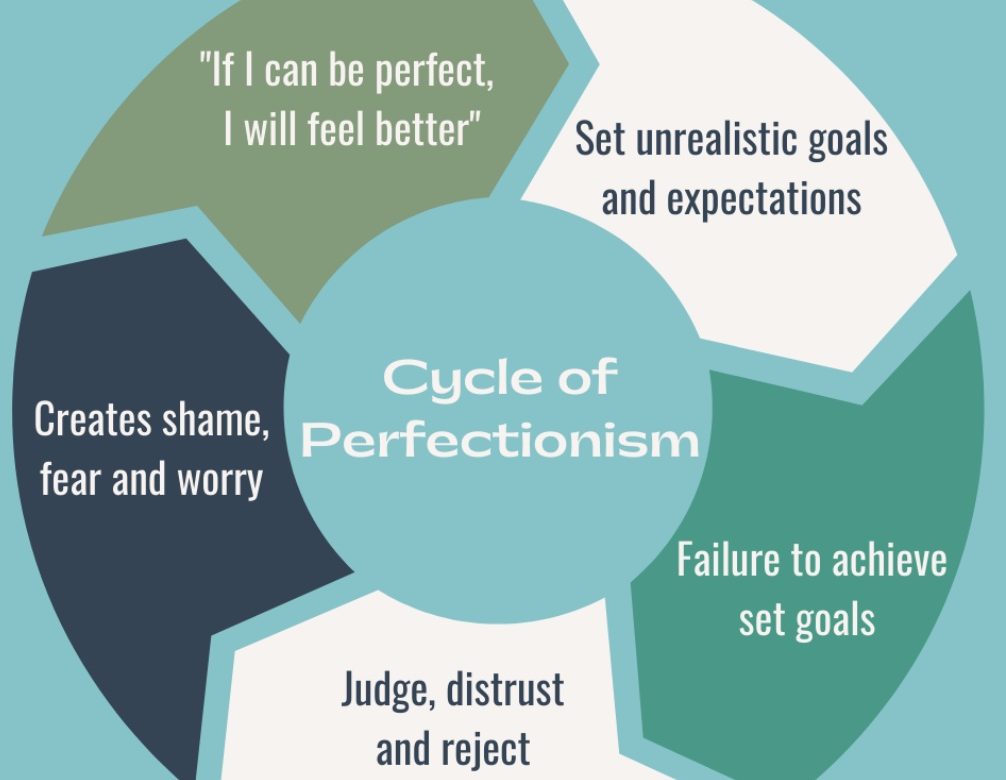
The age-old adage “Nobody’s perfect” frequently echoes in conversations, serving as a gentle reminder to ourselves or others when expectations soar too high. Despite acknowledging our inherent imperfections and the uniqueness they bring, many of us grapple with perfectionism. This mindset is characterised by an incessant pursuit of flawlessness and the imposition of stringent standards upon oneself.
While striving for excellence and achieving goals is beneficial, the relentless cycle of perfectionism can be detrimental to our mental health. It can ensnare us in a state of ‘perfectionist paralysis,’ a debilitating fear that hinders our ability to commence or complete tasks, driven by the aspiration to achieve perfection.
This month, we aim to debunk several myths surrounding perfectionism and explore how Existential Psychotherapy together with Cognitive Behaviour Therapy (CBT) can offer relief.

What is Perfectionism?: Interestingly, there’s no definitive description of perfectionism, as it manifests differently in each individual. Generally, perfectionism involves striving for excessively high standards, which can lead to diminished self-worth and fear of negative judgment when these standards are not met.
It’s crucial to pursue objectives and exert maximum effort. However, when we continuously pressure ourselves to execute flawlessly, tying our self-esteem solely to outcomes and achievements, we exhibit perfectionistic tendencies, which can become problematic.
Common perfectionistic behaviours include repeated checks for errors, procrastination due to the belief that the result is never ‘good enough,’ and a perpetual sense of unworthiness to rest. This pattern of self-critical thinking and perfectionistic actions fosters negative self-talk, undermining our self-esteem.
The Link Between Perfectionism and Procrastination: Contrary to the belief that perfectionists are infallible high achievers, perfectionistic traits are often associated with procrastination.
Procrastination is the act of postponing necessary tasks. Many fall into the trap of procrastination due to perfectionistic thoughts and behaviours.
For instance, setting unreasonably high standards for a due assignment might lead to procrastination, fuelled by beliefs like “I must get it right from the start,” “My work is never good enough,” or “I should only start when I feel completely relaxed, free from anxiety.”
These thoughts stem not from laziness but from ‘perfectionist paralysis’—the avoidance of tasks due to fear of mistakes, which ultimately complicates task initiation and feeds into a cycle of perfectionism and procrastination.
Addressing Perfectionism: Perfectionism is a widespread and understandable phenomenon. Yet, setting implacable standards can cause anxiety and hinder progress.
Thankfully, there are practical and effective ways to address and transform the counterproductive thoughts and actions fueled by perfectionism.
Cognitive Behaviour Therapy (CBT) stands out as an evidence-based approach to lessen the grip of perfectionism. It involves questioning our impractical standards and adopting strategies to decrease behaviors that sustain anxiety around performance, enabling us to overcome these obstacles and foster a deeper sense of acceptance.
Additionally, Existential Psychotherapy, as described by Yalom in 1980, interprets perfectionism as a protective mechanism. It posits that for some individuals, an underlying feeling of worthlessness—or even questioning their right to exist—drives them to seek validation through extraordinary achievements. While this pursuit may yield momentary satisfaction and success, it often leaves them feeling restless, exhausted, and burdened by the looming specter of isolation and meaninglessness.
When you catch yourself having perfectionistic thoughts, talk to yourself as you would to a trusted friend:
- “You’re giving it your all.”
- “I see the effort you’ve put into this.”
- “Making mistakes is okay—I’m human and always learning.”
- “I can embrace my quirks without judgment.”
Embracing Self-Acceptance: Self-acceptance means recognising your strengths and challenges, and valuing yourself for both. As humans, making mistakes and not achieving perfection is inevitable. Over time, appreciating your errors can foster growth and development.
Here are tips for fostering greater self-acceptance in your life:
- Celebrate your uniqueness: Reflect on what makes you distinct and how these aspects contribute to your individuality and merit celebration.
- Highlight your strengths: Acknowledge the qualities you value in yourself, whether it’s your empathy, problem-solving skills, dedication to learning, or kindness.
- Share your experiences: Discussing mistakes or difficulties with others can be relieving. They, too, have likely faced similar issues. Seeking support and understanding that you’re not alone is invaluable.

